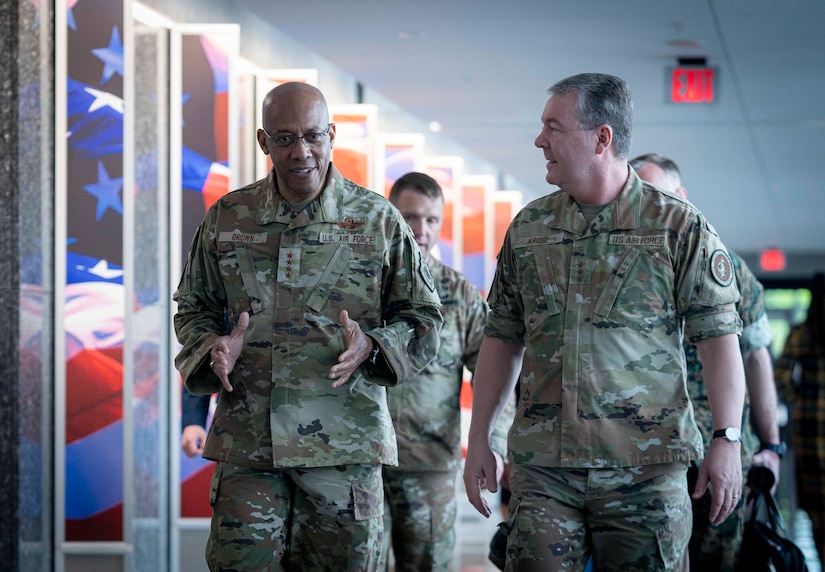The chairman of the Joint Chiefs of Staff discussed threats emanating from Russia’s invasion of Ukraine and why alliances matter in an era of Great Power competition.
Air Force Gen. CQ Brown, Jr., spoke with NBC’s Courtney Kube as part of the Atlantic Council’s Commanders’ Series today.
He also spoke of how the National Defense Strategy‘s list of concerns — China, Russia, Iran, North Korea and violent extremists — have all been active and working together.
Russian President Vladimir Putin’s invasion of neighboring Ukraine is a clear warning to the world, Brown said. “When you have a conflict in one part of the world, it doesn’t necessarily stay in one part of the world,” he said.
Putin’s invasion, and the response of the world to it, may inspire others. China, for example, may take lessons from Russia’s illegal actions and believe they can be applied to Taiwan.
The world’s response to support Ukraine in its fight against its much larger neighbor also sends a message. Brown noted that on Monday, Secretary of Defense Lloyd J. Austin III convened the latest meeting of the Ukraine Defense Contact Group. “This is 50 nations [that] have a vested interest in supporting Ukraine and providing capability,” he said. “If you just look at history, … just one, small conflict can broaden into a much larger conflict. That’s why [Ukraine] is so important.”
Ukraine is part of Europe. It borders four NATO members. The conflict has implications for national sovereignty, the rights of nations and the ability of people to choose how they should be governed. These tenets are important around the world, he said. “It’s part of my job, I spend a lot of time thinking about all the things and getting updates on what’s going on all around the world, because one of those could be a spark elsewhere,” Brown said.
Russia’s invasion was unprovoked against a smaller nation to eliminate the sovereignty of another country. “I think we all should be concerned about that,” the chairman said. “And we don’t want that model to be repeated in other parts of the world.”
The Ukraine Defense Contact Group works to ensure Ukraine has the capability to defend itself. Right now, that means air defense, antiarmor systems, tanks, artillery and more. The focus is on the close battle, Brown said. He also noted that it is not only what the United States provides the Ukrainians, but the rest of the partners too.
Kube asked the general if it limits Ukraine to not use American weapons to strike Russian formations massing for attacks outside the borders of Ukraine. He said Ukraine has other systems it can use to attack outside the nation without using American systems. “They’ve been attacking into Russia,” he said. “We will continue to have dialogue on this.”
Brown said Ukraine has been doing well against a bigger and stronger military. “If you think about it, since the beginning of this conflict, [the Ukrainian military] took back 50 percent of the territory that the Russians first took,” he said. “And the defensive lines that they are sitting on now haven’t changed dramatically in the course of the past year.”
Part of this is because of Ukrainian tenacity, he said. Part of it is because of the help the international partners have provided.
Ukraine will get stronger as a new draft law goes into effect, the chairman said, and those formations receive their equipment and — importantly — the training to use that equipment.
There isn’t one “magic” weapon system that partners could give Ukraine that will turn the tide against the Russians, the general said. “It’s the combination of capability that that has been provided.”
Brown said that when the Russian invasion is defeated, U.S. service members will go back into the country to train the Ukrainian military. Currently, training happens outside the nation.
Russia is desperately looking for allies to help them in their war on Ukraine. “In our national defense strategy, we have five challenges: the People’s Republic of China, Russia, Iran, North Korea and violent extremists,” the general said. “The thing that I’ve noticed over the course of the past several years is they are all active in some form or fashion, and in some cases, working together.”
North Korea is providing capabilities and munitions to the Russians for their war in Ukraine, he said. Iran is providing attack drones. China is “providing some levels of technologies to support [Russia’s] industrial base,” he said. “This is something that we pay attention to closely. It goes back to what I said earlier: What happens in one part of the world, … provides the opportunity for things to spread.
“The goal here is to make sure it doesn’t spread,” he said.
Kube asked the general what he is worried about that Americans are not paying enough attention to?
“That’s like, asking, who’s your favorite child?” Brown said. “The key part for me personally is, it is very easy to get focused on a particular topic of the day and then get your head down and miss something else.”
“It’s important for me to just be able to step back from some of these, so you can actually have a broader perspective, and see if there’s things that are connected,” he continued. “Then look a little bit further down the path.”
The chairman has made it a priority to understand what is happening, and also what are the longer-range implications of what is happening. “Part of that is actually kind of just pulling the strings on certain things of what could happen moving forward,” he said.









